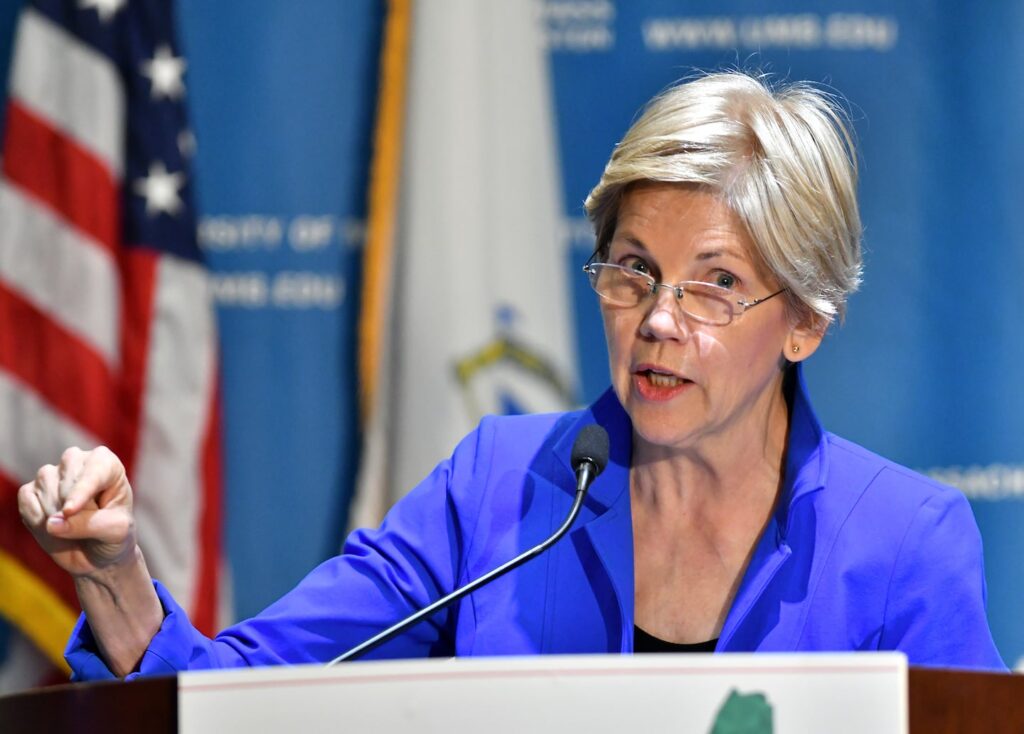The crypto industry has faced an ongoing regulatory battle in the United States, with every leadership shift in Congress bringing new challenges and opportunities for the sector. Recently, news broke that Senator Elizabeth Warren may succeed Sherrod Brown as the Ranking Member of the Senate Banking Committee. Warren’s history of skepticism toward digital currencies and her firm stance on financial regulation has many in the industry wondering: could this leadership change further increase the pressure on crypto companies and users in the United States?

This development comes after the crypto industry reportedly spent $40 million in an attempt to unseat Brown, who has been one of the most vocal critics of cryptocurrency. With Brown’s exit, crypto advocates had hoped for a more favorable regulatory environment. However, Warren’s potential appointment has cast a shadow over these hopes, signaling that the industry’s regulatory challenges may not only continue but potentially intensify.
In this blog post, we’ll delve into the implications of Warren’s likely appointment, her stance on crypto, and what it could mean for the industry’s future.
The Crypto Industry’s $40 Million Push Against Brown
For years, Senator Sherrod Brown has been an influential figure on the Senate Banking Committee, consistently expressing concerns over the risks associated with cryptocurrencies. Brown, a three-term senator from Ohio, has advocated for a cautious approach to crypto, prioritizing consumer protection and financial stability. His stance has put him at odds with an industry that thrives on innovation and seeks regulatory freedom to expand.
The crypto industry’s growing influence in Washington was on full display during the recent elections. Industry leaders and Political Action Committees (PACs) poured substantial funds—estimated around $40 million—into supporting Brown’s opponent, Bernie Moreno, a Republican who took a more supportive stance on digital currencies. The efforts paid off, with Moreno winning the election with over 2.8 million votes, much to the delight of crypto supporters who saw it as a turning point for potential favorable legislation.
But just as the industry began celebrating Brown’s departure, news surfaced that Elizabeth Warren, a longtime crypto critic, was likely to step into Brown’s role. With Virginia Senator Mark Warner deciding to remain on the Senate Intelligence Committee, the path appears clear for Warren to assume the position on the Senate Banking Committee, where she could continue Brown’s critical stance or even ramp up regulatory pressure on the industry.
Who is Elizabeth Warren, and Why is the Crypto Industry Worried?
Elizabeth Warren, the senior senator from Massachusetts, is known for her robust advocacy for consumer protection and financial oversight. Throughout her career, she has championed issues like financial reform, accountability for large financial institutions, and robust consumer protections. In the context of cryptocurrency, Warren’s stance has often been cautious, even skeptical. She has expressed concerns over the potential risks crypto poses to consumers, the financial system, and national security.
Some key points of Warren’s approach to digital assets include:
Consumer Protection: Warren argues that cryptocurrencies, being highly volatile and prone to speculative activity, pose risks to retail investors. She has consistently emphasized the need for regulatory safeguards to protect consumers from fraud, price manipulation, and cybersecurity threats.
Financial Stability: Warren has warned that if not properly regulated, crypto assets could undermine traditional financial institutions, leading to systemic risks. She argues that allowing crypto to operate without proper oversight could pose a threat to the stability of the U.S. financial system.
Anti-Money Laundering (AML) and National Security: Warren has highlighted concerns over crypto’s potential use in illicit activities, such as money laundering and terrorism financing. She supports strict AML and Know Your Customer (KYC) requirements for crypto exchanges to prevent misuse of the technology.
Given her views, Warren’s likely position as Ranking Member of the Senate Banking Committee may bring even more scrutiny to an industry already grappling with a complex regulatory landscape.
The Role of the Senate Banking Committee
The Senate Banking Committee oversees a wide range of financial and economic issues, including banking, insurance, housing, and securities. More recently, the committee has also taken on the task of examining cryptocurrency regulation as digital assets become increasingly prominent. This committee is responsible for shaping legislation that could directly impact the growth and development of the crypto sector in the United States.
In her role as Ranking Member, Warren would work alongside Senator Tim Scott, a Republican from South Carolina who is anticipated to chair the committee. Scott, who is backed by pro-crypto advocates, has previously voiced support for digital assets, emphasizing their potential for innovation and financial inclusion. While Scott’s position could counterbalance some of Warren’s more stringent views, Warren’s influence as a Ranking Member cannot be overlooked. Her presence on the committee is likely to keep regulatory oversight of crypto on the agenda, ensuring that discussions around legislation remain closely scrutinized.
The Future of Crypto Regulation: What to Expect from Warren’s Leadership
If Warren assumes this position, her influence on crypto-related legislation could impact several key areas:
1. Increased Consumer Protections
Warren’s primary concern with crypto has always been consumer protection. She has raised alarms about the speculative nature of digital assets, particularly for retail investors who may not fully understand the risks. Under her leadership, the Senate Banking Committee may push for more stringent requirements around disclosures, consumer education, and transparency from crypto companies. These requirements could include clear warnings about potential losses, data on volatility, and the real costs of transactions.
For exchanges and platforms, this might mean new obligations to clearly inform users of risks. These regulations could be similar to those enforced in other financial markets, ensuring investors are not misled by hype or promotional material.
2. Stricter AML and KYC Policies
Warren has repeatedly expressed concerns over cryptocurrency’s potential use in money laundering and other illicit activities. It’s likely she will advocate for stricter Anti-Money Laundering (AML) and Know Your Customer (KYC) rules, requiring exchanges to verify the identities of users and report suspicious transactions.
Such requirements may increase the operating costs for crypto exchanges, but they also have the potential to foster a safer environment, possibly leading to broader adoption of digital currencies in the long term.
3. Monitoring Stablecoins and Central Bank Digital Currencies (CBDCs)
Stablecoins, which are digital currencies pegged to stable assets like the U.S. dollar, have gained traction as a means of value transfer and payment in the crypto world. However, concerns remain about the backing of these coins and the potential risks they pose to the broader economy.
Warren has previously voiced skepticism regarding stablecoins, noting their risks to both investors and the financial system. Under her oversight, we could see new proposals aimed at ensuring transparency for stablecoin reserves and enhancing federal oversight of stablecoin issuers.
Additionally, Warren’s tenure may bring a renewed focus on Central Bank Digital Currencies (CBDCs), which she views as a safer alternative to private stablecoins. She has expressed interest in exploring the benefits of a digital dollar, seeing it as a means of modernizing the financial system while maintaining government oversight and consumer protection.
4. Tax Compliance and Reporting Standards
Warren has emphasized the need for tax compliance in the crypto sector, believing that the anonymous nature of crypto transactions can allow individuals to evade taxes. As Ranking Member, she may support initiatives aimed at ensuring crypto tax compliance, including increased reporting requirements for exchanges and brokers.
If such policies move forward, crypto exchanges may be required to disclose detailed transaction data to the IRS, similar to traditional financial institutions. This could add more complexity for traders but would align crypto with other financial sectors, fostering greater transparency.
Balancing Warren’s Stance with Pro-Crypto Leadership

While Warren’s presence on the Senate Banking Committee could mean more regulatory scrutiny, her influence will be tempered by Senator Tim Scott’s chairmanship. Scott, a crypto supporter backed by the Stand With Crypto Alliance, has a more favorable view of digital assets, seeing them as tools for innovation and economic growth. This balance of perspectives may create an environment where the crypto industry is still able to operate and grow, though under careful oversight.
Final Thoughts
Elizabeth Warren’s likely succession to Sherrod Brown on the Senate Banking Committee underscores the crypto industry’s ongoing regulatory challenges. Warren’s stance suggests that increased consumer protections, stricter AML/KYC requirements, and tax compliance initiatives may be on the horizon. While her presence as a Ranking Member means that crypto will continue to face regulatory hurdles, the support of pro-crypto lawmakers like Senator Tim Scott may allow the industry some room to innovate within the constraints of a more structured regulatory framework.
In the end, this transition serves as a reminder that the crypto industry is becoming increasingly enmeshed in Washington’s legislative landscape. It is a double-edged sword: on one hand, regulations can foster legitimacy and protect consumers; on the other, they can stifle innovation and limit freedom. How the crypto sector navigates Warren’s leadership could determine its future in the United States.

